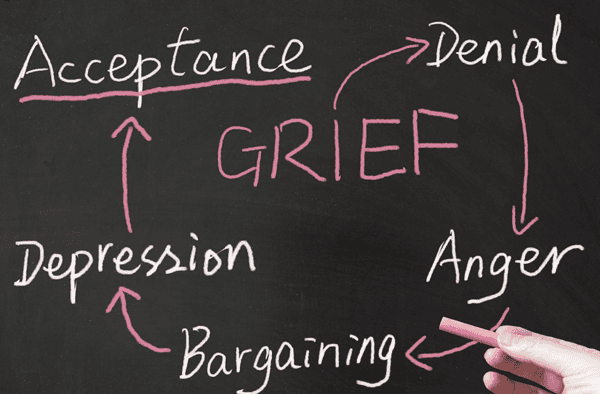Disclaimer: As a professional with decades of experience in both HR and management, I have always held the belief that supporting mental health in the workplace should be a critical priority for all companies. However, I am not a trained mental health expert so what follows is simply the lessons learned from my professional observations while leading diverse teams as well as my own personal experiences in grief.
In recent years, companies have made strides by adding mental health support to their employee outreach initiatives. With their recognition of the impact of mental health on overall well-being and especially productivity, progressive organizations have implemented various programs, including access to Employee Assistance Programs (EAP), mental health resources, and workshops.

Since 1949, the month of May has been recognized as National Mental Health Month. With the recently renewed focus on mental health issues, May’s observation has blossomed into a platform for focusing on all matters related to mental health care, especially the role that companies play in supporting it.
While the progress made by companies in supporting mental health is commendable, often that support in its elementary stages is limited to things like stress management, and that is viewed through a filter of maximizing productivity and/or reducing turnover. But even those simple approaches are contributing to a healthier and more inclusive work environment.
However, as leaders, we must never be satisfied with just an elementary effort in any area. Instead, we should challenge ourselves to take mental health support to new levels including the one topic that will always challenge us. That challenge starts with a question:
Have you ever experienced that hollow feeling in the pit of your stomach that tugs at your heartstrings and makes every step feel heavier?
According to a survey by the American Psychological Association, 88% of respondents reported experiencing moderate to extreme stress due to grief and loss.

Grief, a profound and deeply personal emotion, can envelop us unexpectedly, impacting every facet of our lives, including our work. As employers, coworkers, and leaders, we must recognize that supporting mental health in the workplace extends beyond merely addressing stress. It calls for an empathetic embrace of the complex journey of grief.
Understanding the Complexity of Grief

Grief is a natural reaction to any major life transition that involves loss—financial challenges, divorce, joining a new team, changing roles, switching careers, or organizational restructuring. However, grief is most acute in times of bereavement. Even though grief stems from deeply personal situations, it inevitably shows up in the workplace. As HR professionals and business leaders, we have an obligation to recognize grief’s profound impact and have thoughtful systems in place to support employees navigating loss.
The Grieving Process

Grief is a profound emotional experience that impacts individuals on multiple levels, particularly when it spills into the workplace. But before we tackle the steps to supporting those in grief, we must discuss the grieving process as it is usually understood.
The traditional grieving process, often characterized by a linear progression through stages such as denial, anger, bargaining, depression, and acceptance, has long served as the framework for understanding grief. However, this static model seldom applies to individuals who have experienced loss. This is due to the deeply personal nature of each person’s grief journey.
Grieving is an intricate and subjective process, influenced by a multitude of variables that shape the journey. These variables include the individual’s personality, cultural background, beliefs, relationship with the deceased, the circumstances of the loss, and their overall support system. Additionally, past experiences with grief and other existing mental health factors play a crucial role in shaping the grieving process.
As a result, individuals may experience emotions in varying sequences and intensities with some steps in the process lingering for weeks or months while other steps are never encountered. This journey may often be characterized by periods of resilience, setbacks, and unexpected twists. Acknowledging this individuality and providing empathetic, personalized support becomes essential in helping those who grieve navigate their distinct path to healing and coping with loss.
The Personal Journey
Employees experiencing grief may find themselves facing a range of challenges that can deeply affect their emotional well-being and work performance.
What Employees in Grief May Be Going Through
- Intense Emotional Turmoil Grieving employees may experience a rollercoaster of emotions, including sadness, anger, guilt, and confusion. These emotions can impact their ability to focus and perform at work. Normally rock-solid performers may become ineffective and those with years of reputation as sound decision-makers might make erratic decisions.
- Physical and Mental Exhaustion Grief can lead to fatigue, sleep disturbances, and difficulty concentrating, affecting productivity and overall well-being. Especially for caregivers, the additional requirements of making final arrangements for loved ones or having to oversee the administration of the departed’s estate can add additional fatigue to an already exhausted individual.
- Isolation and Withdrawal Some individuals may withdraw socially, isolating themselves from colleagues, leading to feelings of disconnection. Also, the unpredictability of the emotions of a grieving person can make them overtly self-conscious and lead to trying to hide their frequent emotional outbreaks from negatively impacting the perception of them within the corporate structure.
- Anxiety About the Future Grieving individuals may feel anxious about the uncertainties and changes in their personal and professional lives. The pain experienced can sometimes be most intense not considering the relationship that is ended by death but rather the loss of a potential future no longer possible.
Back is not back
The grief journey is unique to everyone, and there’s no fixed timeline for recovery. Recognizing and respecting this diversity of experiences and no true measure of time that can be applied to the recovery process must color how grieving employees are supported.
“Grief doesn’t have a set timeline; it comes in waves. Some days, I felt fine, and others, the pain was unbearable”
-Anonymous Employee

Managers and co-workers will warmly welcome a grieving associate who has returned to the office as a sign that their period of active grief has ended. However, even the most innocent workday event may trigger the re-emergence of intense feelings of sadness. Sometimes, these episodes may be more intense than what was felt at the initial moment of loss. To help with this reality, supporting employees must always be ready to provide ambulatory comfort weeks or even months after the grieving employee has returned to normal work activities.
Like any business challenge, companies should have a plan ready to mobilize at any time that one of the company’s staff has the misfortune to experience a loss. With that in mind, what concrete steps can companies take to support grieving employees?
Best Practices for Grief Support

The Harvard Business Review states that compassionate employers who support grieving employees can see a 20% increase in productivity and reduced turnover.
Provide ample paid bereavement time-off.
The standard three days is often insufficient. Grief does not fit neatly into a scheduled timeframe, so having flexible, generous time off policies is crucial for employees managing grief. This allows them to attend memorials, process emotions, and handle logistical matters without needing to tap into vacation days.
Make mental health resources easily accessible.
Offer free or low-cost counseling services, support groups, and easily available online information. Such information should be prominently displayed on your employee-facing information portals to lessen the risk that grieving employees struggle to find the resources so critical at times of need. Ensure employees know exactly where to turn if they need help.
Cultivate an open, understanding, and inclusive workplace culture.
Make sure employees feel psychologically safe, being vulnerable, and vocalize their grief-related needs without fear of judgment. Foster camaraderie and compassion amongst teams. Be sensitive and respectful to the nuances of religious and cultural differences around grief.
“No matter what the problem, community is the answer.”
-Organizational Expert Margaret Wheatley
Train managers in grief support.
Include information on the emotional and physical impacts of grief, how to sensitively approach employees who are grieving, and best practices for accommodating their needs. Promote empathy and emotional intelligence.
Be patient with the grieving.
The grief-stricken will become frustrated with the slow progress of “getting back to normal”. Remember that grief doesn’t end after the funeral. Have HR or team leaders follow up with employees periodically grieving employees to see how they are coping and if any additional support or accommodation would help them during this difficult period. Recognize painful anniversary dates but make no assumptions.
The Best Tool in Grief Support

While formal policies are crucial, equally important is peer-to-peer support among coworkers. Simple acts of compassion like sending a condolence card, getting coffee while listening to the feelings of the grieving and offering help with practical matters show grieving employees they are not alone.

As I was experiencing my own personal grief, I understood and appreciated the best intentions of co-workers, but certain interactions frustrated me beyond measure. These frustrating episodes often included a statement directed at me that included “If you need anything, let me know” Fighting back the raw but honest response that I wanted to make, “I want my loved one back” flooded me with sadness as well as guilt for not accepting the positive intent my co-workers were expressing. It was during this time that a co-worker shook me from this dark space. She asked a unique question, and this helped me replace my sadness with more positive emotion and gave me at least a few minutes of peace. I found this question so soul soothing that I have adopted it into my own toolkit for when I am in the role of supporting others who are grief-stricken. The question or more rather statement is:
“Tell me a happy [insert departed’s name] story.”
While it is crucial to avoid making assumptions about what someone needs—asks like the above give an opportunity to share the wonderful nature of the person who was loved so dearly and bring a bright space into what is often a dark landscape. It also reinforces the reality that we are not alone.
While the role of the individual employee in bringing comfort cannot be over-emphasized, the culture of a company that encourages their workers to support each other as the rule rather than the exception is almost equally critical.

Does your company’s culture and values include the advocacy of the importance of the unique individual as their greatest resource? Here at Mercury Performance Group, a company helping organizations of 500 or more employees solve their HR problems, empower their employees, and elevate their performance, we have created evidence of the values of this company by way of our Mercury Manifesto. This manifesto speaks to the importance of every person we interact with both internally and externally. If your company lacks such a central guiding document, we can help you develop one.
Conclusion
Grief is a profound and intricate journey that affects employees on multiple levels. Understanding that the process is non-linear and embracing the complexities of grief is crucial for offering genuine support. By applying the principles of empathy and comfort, we can create a compassionate and supportive work environment, nurturing the mental health and well-being of every individual, especially during their most challenging times.

